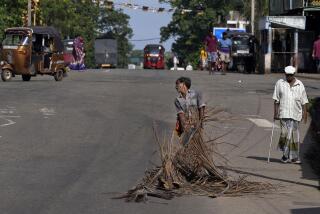Deficits, Corruption at Root of Downturn : Liberia Beset by Fiscal Woes Despite U.S. Aid
- Share via
MONROVIA, Liberia — Liberia’s economic woes are immediately apparent in this bustling capital of half a million set on a series of lush hills overlooking the Atlantic and built by freed black American slaves in the early 19th Century.
Most dwellings are tin-roofed, most streets are pot-holed, houses and apartment buildings are run down, elevators and telephones rarely work and the city has daily power cuts.
Monrovia, which still has a strong American flavor, is one of Africa’s oldest cities and it looks its age.
“It is a sad irony for a country into which the United States has poured millions of dollars to make it a showcase of free enterprise in this part of Africa,” commented one Liberian politician.
Political uncertainty, falling prices for traditional exports, chronic budget and trade deficits and high-level corruption have played havoc with the Liberian economy.
Fall Elections
Diplomatic and banking sources do not expect the situation to improve significantly until after legislative and presidential elections scheduled for October and November that should return Africa’s oldest republic to civilian rule.
Although spared by the drought and famine affecting other West African nations, fertile Liberia--with a population of only 2 million--is by far the biggest recipient of U.S. aid on the continent.
Soon after Samuel Doe and a group of enlisted soldiers overthrew the American-Liberian oligarchy that had ruled from 1847 to 1980, the United States started injecting money into the country.
Washington’s largess was aimed at ending a flirtation with Libya by the country’s youthful military leaders and persuading them to hold free elections, according to diplomatic sources.
The scheme was successful. But countless plots and purges, a recent assassination attempt on Doe and doubts over the fairness of the election process have prompted potential investors to adopt a “wait-and-see” attitude.
Meanwhile, although U.S. aid has shot up to a planned $93 million next year from only $10 million at the time of the coup, the economy has deteriorated sharply.
One of Doe’s early and controversial measures was to double civil service and military wages. Banking sources say the wage bill accounted for 50% of the $247-million recurrent expenditure for 1983-84.
“This means that U.S. aid has gone essentially to budgetary support, food aid and military assistance, with virtually nothing left for development,” one opposition politician remarked bitterly.
Because Liberia uses the U.S. dollar as its currency, budget deficits are a major factor in causing foreign-exchange shortages, banking sources say.
With the deficits becoming chronic and income from exports like iron ore and rubber steadily declining, the official domestic and external debt had risen to more than $1 billion by March, 1984, they say.
Debts Rescheduled
To ease pressure on its resources, Liberia has had to reschedule its official debts three times. The International Monetary Fund has provided short-term loans in a series of stand-by arrangements.
Liberia has been badly hit by a slump in the demand for iron ore. It is one of the world’s largest producers and iron ore accounts for two-thirds of its export earnings.
The American company Firestone, Liberia’s largest private employer, had to trim its work force long ago because of falling demand for rubber, which accounts for an average 15% of export revenues.
High-level corruption has reached epidemic proportions, and diplomatic sources say the deputy chief of the presidential guard tried to murder Doe on April 1 because he was about to be named in a major financial scandal.
The man, Maj. Moses Flanzamaton, was later executed.
Doe has ordered government officials and businessmen owing state corporations an estimated $220 million to pay up or go to jail.
The banking sources say much of the money recovered would help pay salaries owed civil servants.
A major reason for Monrovia’s state of neglect is that the many wealthy Liberians who fled the country after the coup own scores of buildings in the city center.
Some have come home following Doe’s pledge that a civilian government will take over in January, 1986. But diplomats expect most of the former elite to remain abroad until the elections are over and political stability returns.
More to Read
Sign up for Essential California
The most important California stories and recommendations in your inbox every morning.
You may occasionally receive promotional content from the Los Angeles Times.













